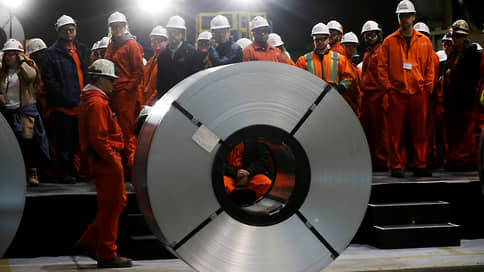Steel does not cook, does not melt and does not pour – Newspaper Kommersant No. 167 (7368) of 09/12/2022
[ad_1]

Ferrous metallurgists of Europe announced the threat to the existence of the industry due to high prices for energy resources. Steel production in Europe has already fallen by 5%, and most steel companies have suspended smelting and postpone the restart of equipment. According to analysts, the crisis may force the closure of up to a third of all capacities in Europe, including most of the electric steel plants.
European metallurgy is reducing production, while competitors from other countries are increasing steel exports to the EU, the European Steel Industry Association (Eurofer) said on September 9. It was timed to coincide with an extraordinary meeting of EU energy ministers, which discussed, among other things, the introduction of a ceiling on imported gas prices (see Kommersant on September 10).
The association believes that high gas and electricity prices threaten the viability of the steel sector in Europe. The statement states that foreign producers do not face the same increase in energy prices, which allows them to dump and increase supplies to Europe.
This leads to the closure of factories, a drop in production and staff cuts. The Association expects urgent measures from the EU authorities to stabilize the European energy market, otherwise the survival of the European metallurgy will become doubtful.
According to World Steel, in the first seven months of 2022, steel production in the European Union decreased by 4.8% in annual terms, to 86 million tons. In July, the fall was stronger – 6.7%. In Russia, which was the largest external supplier of steel to the European market, production in January-July fell by 7%, to 41.4 million tons, and in July – by 13.2%. According to Platts, in recent weeks, the largest European steel companies – ArcelorMittal, Salzgitter, Arvedi, Acciaierie d’Italia, Marcegaglia, NLMK Strasbourg, Acerinox, Stahl Gerlafingen, Izmir Demir Celik, Liberty Ostrava, HBIS Serbia, US Steel Kosice and Metinvest – have stopped production or announced impending shutdowns or delays in restarting equipment due to high energy prices and weakening market demand.
Steel imports to the EU countries, on the contrary, are increasing. According to Eurofer estimates, in the first half of the year it grew by 9% compared to the same period last year. Purchases of flat products increased by 6%, and long products – by 18%. Five countries accounted for 67% of all imports of finished steel: Turkey (17%), India (10.1%), South Korea (9.3%), Russia (7.3%) and Ukraine (5.3%). Of these, only South Korea was able to increase imports – by 35%. Imports from Russia fell the most, by 46%.
The critical situation is declared not only by ferrous metallurgists in Europe, but also by non-ferrous ones. Last week, the European Association of Non-Ferrous Metals Producers (Eurometaux) applied to the European Commission with proposals to reduce the impact of the energy crisis. The association said that 50% of the EU’s zinc and aluminum production capacity had already been shut down, while the production of silicon and iron alloys had been significantly reduced. Therefore, the association invites the EC to diversify the sources of gas supplies and evaluate options for temporary measures in order to balance profits in other sectors. In fact, we are talking about subsidizing metallurgical enterprises through taxes on the profits of oil and gas and energy companies.
Sergey Grishunin of the NRA estimates that 7 million tons of steelmaking capacity, or 4% of the total nominal capacity, has been announced to be shut down in Europe so far. Most likely, the analyst says, in the EU, by the end of the year, most of the energy-intensive electric steel-smelting plants, which provide 42% of the total steel output, will be closed. “It can be assumed that the potential loss of smelting by European metallurgy can reach 20-30 million tons in the second half of 2022. Next year, if the situation does not improve, we can talk about the loss of 50 million tons,” he says.
[ad_2]
Source link





